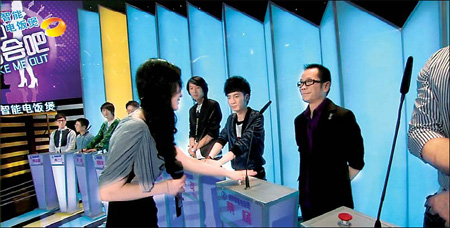Playing by the rules in the game of love
Striking a balance
Of course, the controversy attracted only more viewers, leading to some raising concerns that television producers encourage, or even manufacture, such outlandish comments.
However, 25-year-old bachelor Wang Wenqing, who appeared on If You Are the One in June, rubbished the claims and insisted his experience was "very real".
 |
|
A female contestant switches off the lights of the men she is not interested in for an episode of Hunan TV's popular Take Me Out. |
Before filming his introductory video for the show, Wang said he went through at least five rounds of interviews with producers and hosts, either on the phone or face to face.
"I think they wanted to verify the information I provided and make sure I was expressing my honest views on love and marriage," he told China Daily, denying he was given any hints as to what answers they wanted to hear.
"Sometimes I asked for their opinions on issues but they told me there is no right or wrong answers, as long as I spoke my own mind," he said.
The Shanghai management consultant said he believes he was chosen as a contestant because he represents a certain group of people: Ambitious, hardworking young professionals who would rather keep a low profile than be in the spotlight. Similarly, said Wang, so-called material girls like Ma also represent a section of society.
"Although the number of these women is not few, I feel their attitudes and beliefs are amplified by the media," he said.
Wang Gang, one of the producers on If You Are the One, agreed and added: "Our aim is to show the conflicts and collisions caused by the different views of different people."
Amplified or not, media analysts argue the promotion of materialistic attitudes on television matchmaking contests has a negative impact on young people.
"It is OK for producers to recruit contestants with different personalities and views but they also need to take into account their shows' influence on society," said Hu at Communication University of China. "These shows need to strike a balance between commercial interests and social impact."
As the temptation to use sensationalism to attract viewers grows (a result of the changing tastes of the traditionally conservative Chinese audience), the media needs to shoulder more responsibility, argued Zheng at Renmin University of China.
"Media outlets should safeguard the core values of a society," he said, "not just blindly follow hot issues."
Dating show fan Qian, however, shrugged off any suggestion of viewers being affected by what the contestants think.
"You can't take that gold-digging mentality stuff too seriously," she added. "My beliefs about life and marriage will never change because of that."
 0
0 






